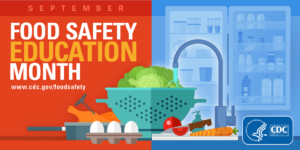
Anybody can get food poisoning, but some people are more likely to get seriously ill.
Every year, an estimated 1 in 6 Americans (or 48 million people) get sick, 128,000 are hospitalized, and 3,000 die of foodborne diseases. However, certain groups of people are more likely to get a foodborne illness (also called food poisoning) or get seriously ill.
September is Food Safety Education Month. Read on to learn more about why certain groups have a higher chance for food poisoning and what steps they can take to protect themselves.
Why are some people at higher risk?
Some groups of people are more likely to get food poisoning because their body’s ability to fight germs and sickness is not as effective as other people’s for a variety of reasons.
- Children younger than 5 years of age have immune systems that are still developing, so their body’s ability to fight germs and sickness isn’t as strong. Food poisoning can be particularly dangerous for them because illness can lead to diarrhea and dehydration.
- Adults aged 65 and older have a higher risk because as people age, their immune systems and organs don’t recognize and get rid of harmful germs as well as they once did.
- People with weakened immune systems (from medical conditions or their treatment, such as cancer, HIV/AIDS, or diabetes) can’t fight germs and sickness as effectively.
- Pregnant women are more likely than other people to get sick from certain germs.
How can I prevent food poisoning?
If you or someone you take care of is in one of these high-risk groups, learn which foods to avoid and what steps you can take to prevent food poisoning.
People who are more likely to get food poisoning should not eat the following:
- undercooked or raw animal products (such as meat, poultry, eggs, or seafood)
- raw or lightly cooked sprouts
- unpasteurized (raw) milk and juices
- soft cheese (such as queso fresco), unless it is labeled as made with pasteurized milk
Tips to prevent food poisoning
- Clean – Wash your hands and work surfaces often. Germs can survive in many places around your kitchen, including your hands, utensils, cutting boards, and countertops.
- Separate – Separate raw meat, poultry, seafood, and eggs from ready-to-eat foods in your shopping cart, refrigerator, and meal preparation area.
- Cook – Cook food to the right internal temperature to kill harmful bacteria. Use a food thermometer.
- Chill – Keep your refrigerator below 40oF. Refrigerate leftovers within 2 hours of cooking (or within 1 hour if above 90oF outside).
What are symptoms of food poisoning?
Food poisoning may cause symptoms like diarrhea, vomiting, upset stomach, or nausea. See your doctor if you have:
- High fever (over 101.5°F)
- Blood in stools
- Frequent vomiting that prevents you from keeping liquid down
- Diarrhea that lasts more than three days
- Signs of dehydration, including decrease in urination, dry mouth and throat, and feeling dizzy when standing up
For more information, check out the Partnership for Food Safety Education and Centers for Disease Control and Prevention websites.

